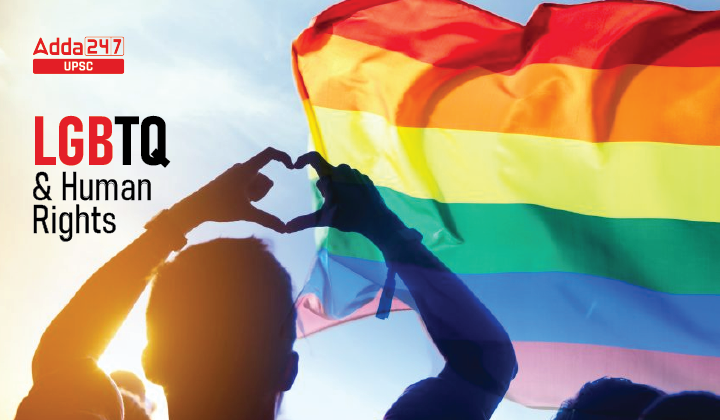Table of Contents
LGBTQ and Human Rights- Relevance for UPSC Exam
General Studies II- Issues related to Transgenders.
In News
- Four years after landmark LGBTQ verdict: The march to full citizenship. On September 6, 2018, exactly four years ago, in Navtej Singh Johar and Ors v Union of India, a five-judge constitution bench of the Supreme Court, in a beautifully elaborate decision, liberated LGBTQI Indians from the darkness of Section 377 of the Indian Penal Code, 1860.
What is LGBTQ?
- LGBTQ stands for lesbian, gay, bisexual, and transgender. In use since the 1990s, LGBTQ as well as some of its common variants, functions as an umbrella term for sexuality and gender identity.
What is Section 377 of the IPC?
- It states – Unnatural offences: Whoever voluntarily has carnal intercourse against the order of nature with any man, woman or animal shall be punished with imprisonment for life, or with imprisonment of either description for a term which may extend to ten years, and shall also be liable to fine.
- The terms “carnal intercourse” and “against the order of nature” are not defined precisely anywhere in the code.
Role played by the Judiciary
- The Delhi High Court’s verdict in Naz Foundation vs Government of NCT of Delhi (2009) was a landmark in the law of sexuality and equality jurisprudence in India.
- The court held that Section 377 offended the guarantee of equality enshrined in Article 14 of the Constitution, because it creates an unreasonable classification and targets homosexuals as a class.
- In a retrograde step, the Supreme Court, in Suresh Kumar Koushal vs Naz Foundation (2013), reinstated Section 377 to the IPC.
- However, the Supreme Court in Navtej Singh Johar & Ors. vs Union of India (2018) declared that the application of Section 377 IPC to consensual homosexual behavior was “unconstitutional”.
- This Supreme Court judgment has been a great victory to the Indian individual in his quest for identity and dignity.
- It also underscored the doctrine of progressive realization of rights.
Road Ahead
- Overarching legislation is needed to guarantee equality to all persons on the basis of sexual orientation, gender identity and expression, sex, caste, religion, age, disability, marital status, pregnancy, nationality, and other grounds.
- The law should impose obligations of equality and non-discrimination on all persons, public and private, and in the areas of education, employment, healthcare, land and housing and access to public places.
- It should provide for civil remedies to stop discriminatory behavior, costs and damages, and positive action to make reparations.
- We need an equality law to define what equality would encompass.
- Supreme Court comes held in its privacy judgment in K.S. Puttuswamy v. Union of India (2017) that equality and liberty cannot be separated, and equality encompasses the inclusion of dignity and basic freedoms.
Way forward
- Schools and colleges must bring changes in curriculum for a better understanding of the community.
- People of a different sexual orientation or gender identity often narrate harrowing tales of bullying, discrimination, stigma and ostracization.
- Gender-neutral restrooms should be compulsory in educational institutes and other places.
- Parents too need to be sensitized, because the first point of misunderstanding and abuse often begins at home, with teenagers being forced to opt for “conversion” therapies.
Conclusion
- Justice Chandrachud, speaking on the fourth anniversary of Johar and the journey ahead, while quoting the Beatles classic “All you need is love”, notes that “simply love is not enough”. Rights are necessary which will enhance dignity of the community.




 TSPSC Group 1 Question Paper 2024, Downl...
TSPSC Group 1 Question Paper 2024, Downl...
 TSPSC Group 1 Answer key 2024 Out, Downl...
TSPSC Group 1 Answer key 2024 Out, Downl...
 UPSC Prelims 2024 Question Paper, Downlo...
UPSC Prelims 2024 Question Paper, Downlo...





